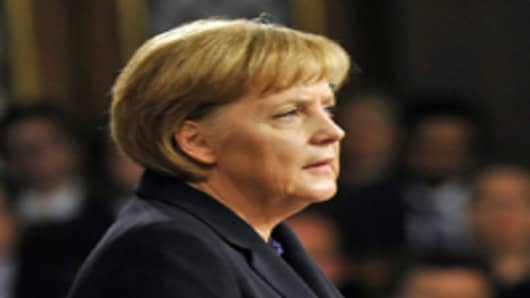Do not be surprised that German Chancellor Angela Merkelis leaving the door open for German taxpayers to loan more money to Greece.
This despite opinion polls indicating the majority of German voters oppose a second bailout and few believe Berlin will get back the $30 billion it’s already pledged.
Ball park figures put together by JP Morgan Chase highlight the devastating effect a traditional default by Greece would have, with bond holders forced to declare capital losses—or take a "haircut"—on the amount Athens not longer intended to honor.
It’s the reason Merkel and the rest of Europe will loan Athens more money: to keep Greece servicing its debt and prevent those writedowns.
Greek banks held about $70 billion of Greek government debt at the end of last year's third quarter. But the discounts that Greek banks trade at on the Athens stock market already indicate that a 35% writedown is priced in, according to JP Morgan.
A writedown of 50% would all but wipe the banks out. And if they collapsed, the country would likely melt down into economic chaos.
European banks outside Greece held $72 billion of Greek government debt at the end of the third quarter. But they've also loaned $165 billion to the private sector in Greece—debts that clearly run the risk of not being serviced, particularly if the local banks melt down.
So West European banks have a total exposure of roughly $237 billion to Greece, much of it presumably not currently marked to market because the banks show them as being "held to maturity" in their capital structure.
Writedowns would change that.
More specifically that total exposure is split—$98 billion owed to the French banks, $72 billion to the Germans.
Even that is only the start of why Angela Merkel and French President Nicolas Sarkozy will throw more of their taxpayers’ cash at Greece.
Because if politicians in Athens give up on brutal austerity—and Greece leads the way to default—Ireland's politicians are likely to follow, throwing in the towel on their own tough choices and default.
Ireland owes European banks $645 billion—that's $215 billion to the Germans, $82 billion owed to the French and a whopping $237 billion to the British banks, estimates JP Morgan.
If Greece defaults, awkward questions would soon be asked about the future solvency of the European Central Bank.
To prop up peripheral bond markets, JP Morgan estimates the ECB has bought $57 billion of Greek government debt at probably 80 cents on the on the dollar, so assume a face value of $72 billion.
The ECB has also directly loaned the Greek banks about $130 billion, for which they posted $207 billion in collateral.
So JP Morgan concludes the ECB's total notional exposure is $278 billion ($72 billion plus $207 billion).
But since it has offset 68% of that by loaning or investing $187 billion ($57 billion plus $130 billion) it says it's protected to a haircut of 32%. Though it seems unlikely the ECB could get its loans back from the banks if they're melting down.
Those losses would be shared between the euro zone's 17 national central banks, which it estimates have $116 billion in reserves, so could arguably absorb a Greek default.
But, again, what if Ireland follows?
The ECB's total exposure to Ireland is $244 billion if you add in Dublin’s own local safety net for which the ECB is presumably the ultimate backstop. That’s a second default that the ECB could not afford uless it either it prints more money to support itself or taxpayers in 17 other EU members pony up more cash to do the same.
Neither option would go down well in Berlin.
If Greece keeps paying its bills, the whole house of cards still stands, and that is the game that Europe will keep playing.
Ultimately Greece’s repayment schedule may be extended or France and Germany will orchestrate swapping Greek debt, at a moderate discount, for EU-guaranteed debt, Brady bond-style from the 1980s.
But one things is for sure, neither Merkel and Sarkozy are about to step away.



